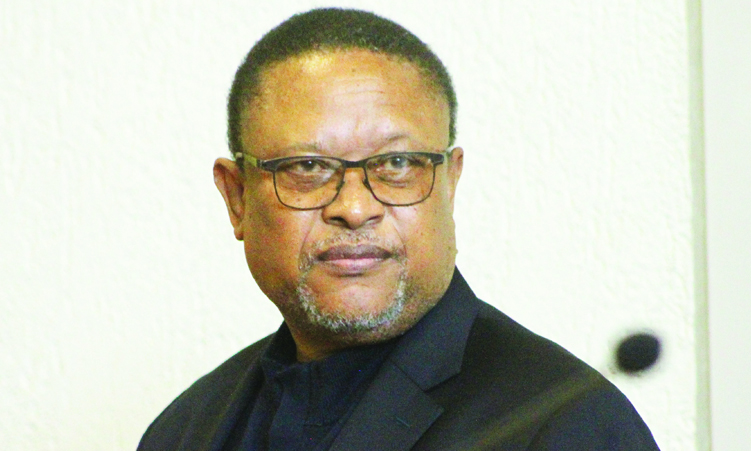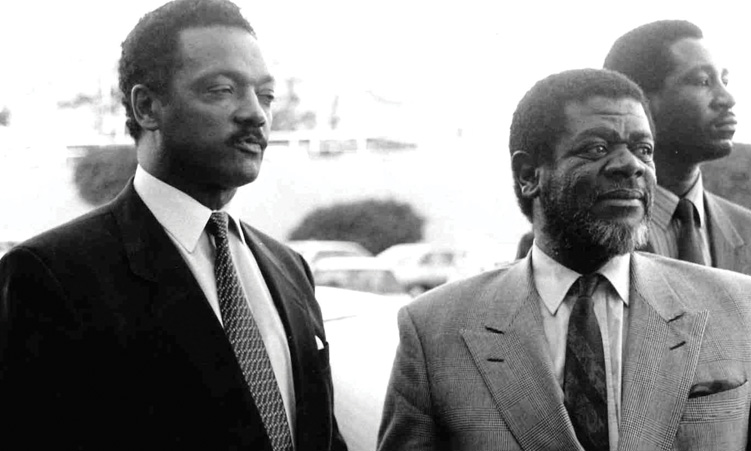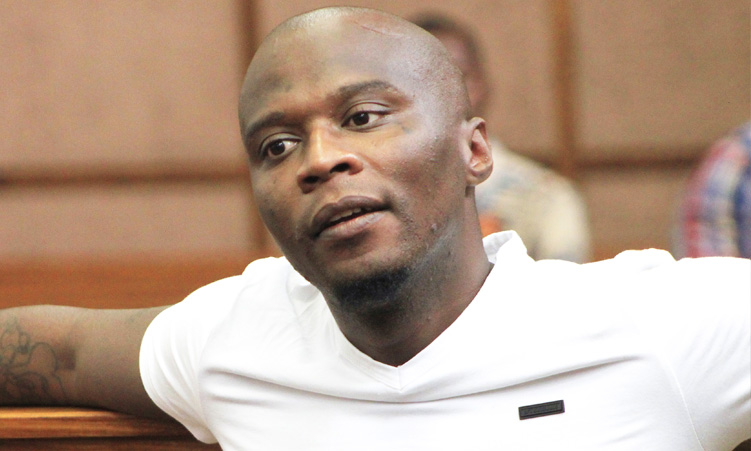Former fisheries and marine resources minister Bernhard Esau says four of his co-accused in the Fishrot fishing quotas fraud and corruption case used his name to set up the alleged scheme through which they benefited from Namibian fishing quotas that were sold to the Icelandic fishing company group Samherji.
After some prodding from deputy prosecutor general Cliff Lutibezi, who continued to cross-examine Esau in his bail hearing in the Windhoek High Court on Friday, Esau told the court his name was used by former attorney general and justice minister Sacky Shanghala, former National Fishing Corporation of Namibia (Fishcor) board chairperson James Hatuikulipi and his son-in-law Tamson Hatuikulipi in dealings that they had with the Samherji group.
It took repeated questions from Lutibezi before Esau named the people that he said had used his name to strike deals with Samherji for the Icelandic group’s use of fishing quotas allocated while he was Namibia’s minister of fisheries and marine resources.
Esau (65) said it was after the state’s docket, containing the evidence collected during the investigation of the Fishrot case, had been disclosed to him that he could see his name had been used by his co-accused.
“I have picked up in the disclosure that my name was floated around as a minister who has given blessings for issues,” he remarked.
With Lutibezi continuing to prod him to identify the people that he said had been using his name, Esau stated: “It was very clear in the disclosure that Sacky [Shanghala] has used my name.”
He continued that the disclosed docket also contains a statement from a witness who said James Hatuikulipi and Tamson Hatuikulipi claimed he had given instructions that some fishing quota recipients should enter into catch agreements with Samherji.
Previously in his testimony, Esau also told judge David Munsu that another of the men charged in the Fishrot matter, former Fishcor chief executive officer Mike Nghipunya, used his name when he claimed that Esau had given instructions that quota usage fees which Samherji paid to Fishcor had to be paid into trust accounts of the law firms De Klerk, Horn and Coetzee Incorporated and Sisa Namandje and Co.
Nghipunya also claimed that Esau had given instructions that some of the money paid by Fishcor to an account of Sisa Namandje and Co in December 2015 had to be used to bankroll a Swapo election campaign. Esau dismissed that version of Nghipunya as “devoid of any truth”.
The state is alleging that Esau approved the allocation of horse mackerel quotas that were awarded for “governmental objectives” to the company Namgomar Pesca Namibia and the state-owned Fishcor, and that proceeds from those quotas amounting to some N$317 million were unlawfully diverted to his co-accused in the Fishrot case and to himself.
In his testimony on Friday, Esau denied that he was a participant in a scheme that the state alleges was set up to get access to Namibian fishing quotas.
“There was no scheme, to my understanding,” he said. “If there was a scheme, I was not part of that scheme.”
Esau added: “If I was part of a scheme and that scheme has generated hundreds of millions of Nam dollars, what did I benefit from this very scheme?
“Up to now I’m still a poor Esau.”
Evidence on which Lutibezi has been questioning Esau includes an email message from Shanghala to former Samherji executive Jóhannes Stefánsson near the end of July 2013, in which Shanghala appeared to make references to Esau as “the Minister” and set out a proposed plan to exploit marine resources in Angola and Namibia under a fisheries cooperation agreement between the two countries.
Shanghala was the chairperson of the Law Reform and Development Commission at the time of that email message, and also in June 2014, when he was part of a delegation that accompanied Esau on a visit to Angola for the signing by Esau and his Angolan counterpart of a memorandum of understanding on cooperation in the areas of fisheries and aquaculture.
The office of the fisheries ministry’s then permanent secretary decided who was to be part of the delegation that travelled to Angola, and Shanghala’s presence as part of the delegation could be explained only by that office, Esau said during his testimony earlier last week.
As minister of fisheries, he did not know “what was brewing behind me” and that “others were involved maybe in tapping the opportunity for business”, Esau also said on Friday.
He denied that he ever had meetings with Shanghala, James Hatuikulipi and Tamson Hatuikulipi to discuss the fisheries memorandum of understanding agreed between Namibia and Angola in June 2014.
The bail hearing, which started in December last year, has been postponed to 9 June for further dates to be arranged for its continuation.
Esau, who is being represented by defence lawyer Florian Beukes, has been held in custody since his arrest near the end of November 2019.
In an age of information overload, Sunrise is The Namibian’s morning briefing, delivered at 6h00 from Monday to Friday. It offers a curated rundown of the most important stories from the past 24 hours – occasionally with a light, witty touch. It’s an essential way to stay informed. Subscribe and join our newsletter community.

The Namibian uses AI tools to assist with improved quality, accuracy and efficiency, while maintaining editorial oversight and journalistic integrity.
Stay informed with The Namibian – your source for credible journalism. Get in-depth reporting and opinions for
only N$85 a month. Invest in journalism, invest in democracy –
Subscribe Now!











